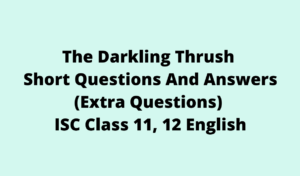The Darkling Thrush Short Questions And Answers (Extra Questions) – ISC Class 11, 12 English
English is a difficult subject for many people to learn. Some students may become frustrated and give up, but here’s The Darkling Thrush Short Questions And Answers (Extra Questions) – ISC Class 11, 12 English to help you maintain your momentum! This The Darkling Thrush Short Questions And Answers (Extra Questions) will provide all necessary information needed in order to study ISC Class 11, 12 English successfully at home or school; it includes detailed grammar rules with examples that were used during today’s class discussion on the ISC English Exam.
The Darkling Thrush Short Questions And Answers (Extra Questions) in English, ISC Class 11, 12 makes it easier to understand the story. Understanding every detail of a story is important for scoring higher on an exam and expert writers have made sure that you know how everything flows together by summarizing perfectly!

1. Throw light on the phrase “The ancient pulse of germ and birth/ Was shrunken hard and dry.” Concerning this, show the bleakness in 19th century England.
Answer- The famous Victorian poet of the 19th century, Thomas Hardy wrote The Darkling Thrush, in 1899. Originally, the poem was under the title of “By the Century’s Daybed 1900”. With its rumbling imageries and poetic aura, Hardy had conspicuously brought out the desolation, disparity, bleakness and the Moorish atmosphere of the 19th century England which was about to witness the successive century.
The phrase referred here loudly roars about the intense and rapid change caused in the society due to the sudden transition between the Victorian era (1837-1901) and the Modern era. Thomas has portrayed here that, how the nature of that time was snatched of its power of reformation, the vitality of the entire process of “germ and birth” was altered and left bewildered.
In these following lines, Hardy has staunchly deromanticised nature by ghastly taking away the capacity for renewal, in a way freakishly cementing the entire notion of bleakness in Victorian society.
2. Describe with reference to the poem “The Darkling Thrush” how is the song of the Thrush at the centre of the poem?
Answer- The Darkling Thrush by Thomas Hardy has always struck the reader’s attention for its immensely strong portrayal of the contrast of the desolation of the speaker, reflective of his state of mind, with the joyful song of a thrush.
The thrush referred here is not completely in a jovial condition but Hardy has meant it to suffer, as evidenced from the words “An aged thrush, frail, gaunt, and small, / In blast-beruffled plume”.
Yet despite all the difficulties, it sings its ever soothing songs. This shows us how hard be the hurdles, no day there will always be a ray of hope that will eventually overcome hardships.
In this way, to show us a typical way of recovery and rejuvenation, Hardy has brought the hopeful thrush in play and subsequently portrayed it as one of the central characters of the poem.
3. What does the phrase “I leant upon the coppice gate” signify?
Answer- The following lines are from the famous Victorian poem of the late 19th century entitled “The Darkling Thrush” by Thomas Hardy. The lines show us how the weight of desolation and dismal bends the whole society in the intense transition.
We should also keep in mind while reading the poem that in the following era, there was huge turmoil due to the rapid change in polity, society and religious beliefs due to the developments in science and technology. These metamorphoses had changed the entire nature of the Victorian era to a bag full of miseries, disbelief, bleakness etc.
The narrator leant upon the coppice gate unable to bear the load of these disparities. “coppice gate” refers to the area that opens into the woods. This entrance marks the beginning of the new 20th century. The Darkling thrush hinted at this very fact subsequently in the poem.
4. The Darkling Thrush was written when the nineteenth century was coming to an end. How is the poem related to it?
Answer- Thomas Hardy penned down The Darkling Thrush during the huge turmoil of late 19th century England. The transition from the Victorian to the modern era was quite full of doubts, uncertainties and sadness.
One can witness the gloominess of the era in the atmosphere. This poem specifically signifies to mark the end of the 19th century and doubts about the new age. Originally, titled ‘By the Century’s Deathbed, 1900’, shows a clear indication of how this poem is closely related to the late 19th century coming to an end.
Everything in nature seemed odd, mourning over the death of the century. The clouds that hung over the earth seem to serve as a tomb for the burial of the dead body of the century. The joyful voice of the little thrush is a reminder of the fact that death is not the end.
There is life beyond death which is the cycle of rebirth. The poet’s puzzling response only reflects the human anxiety about it. Like others, he is not sure how the new times would be better than the old ones.